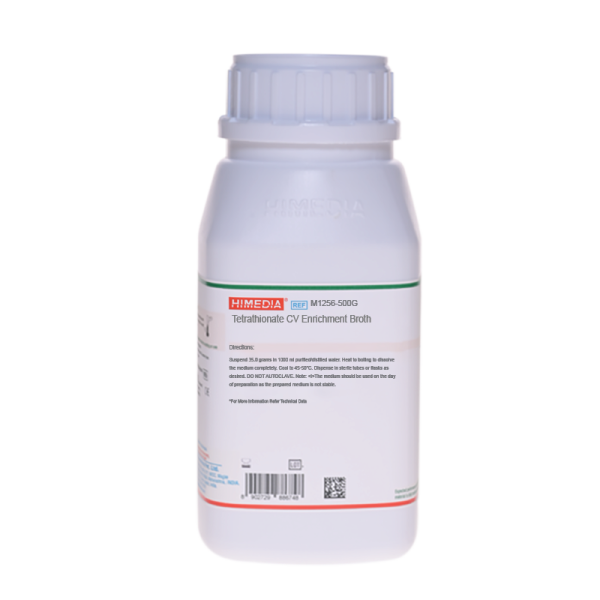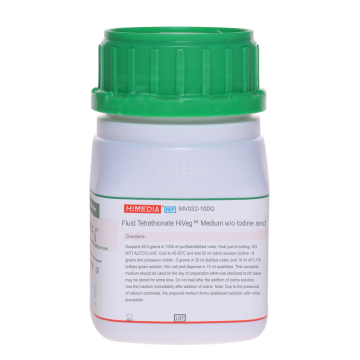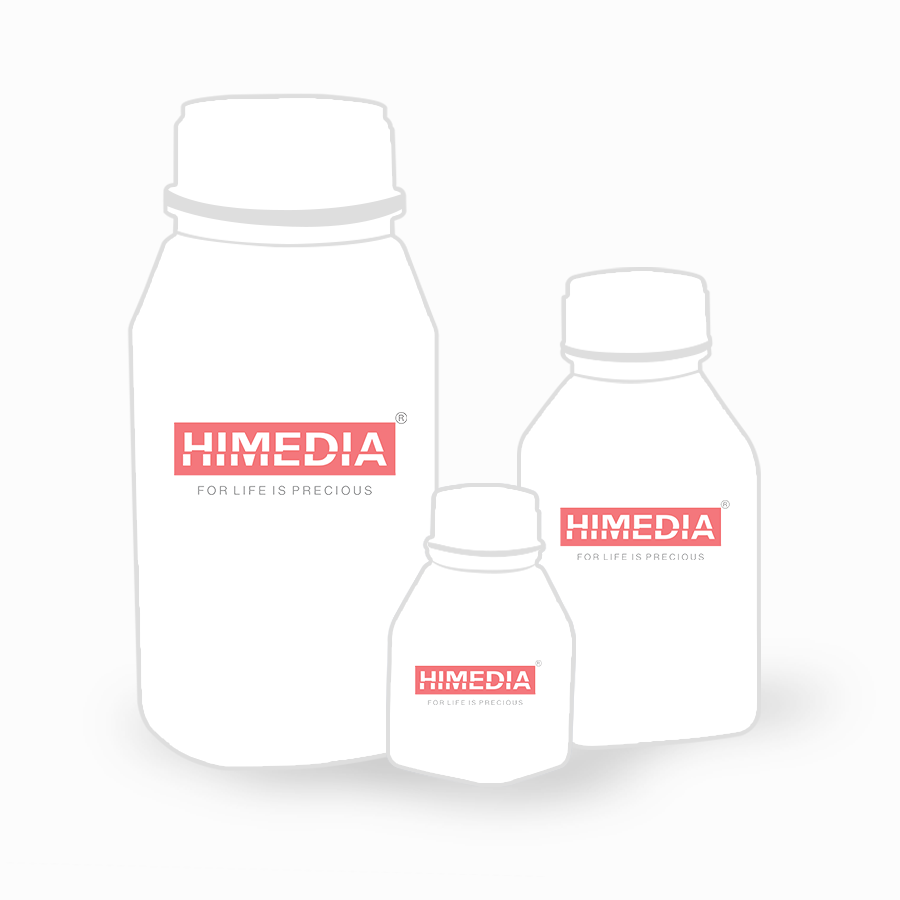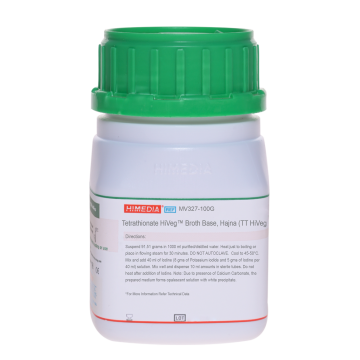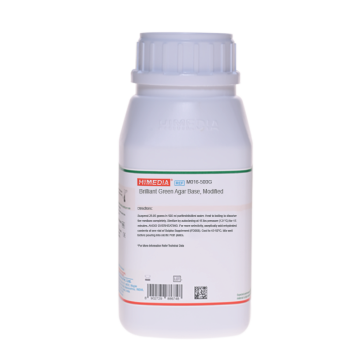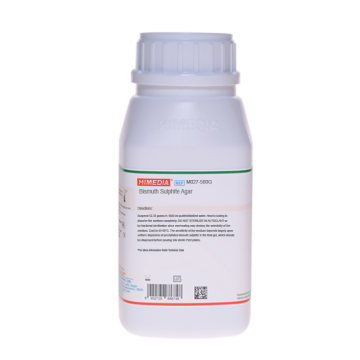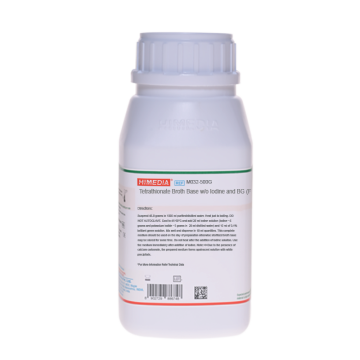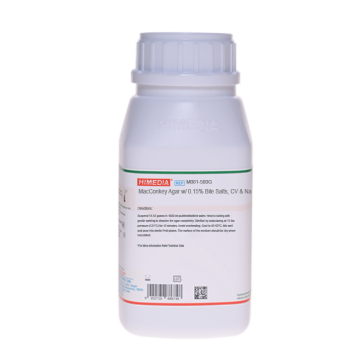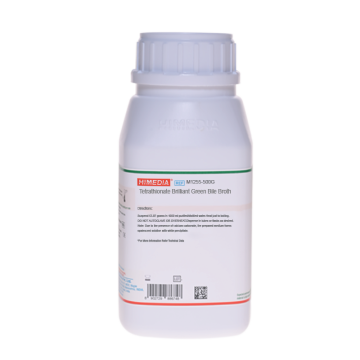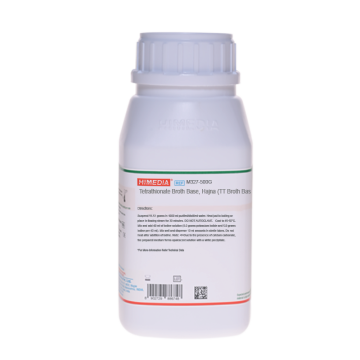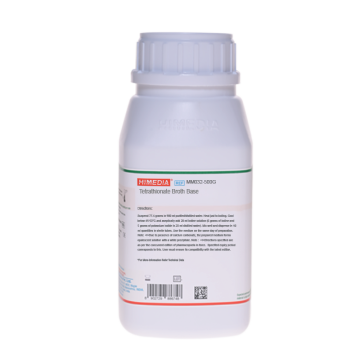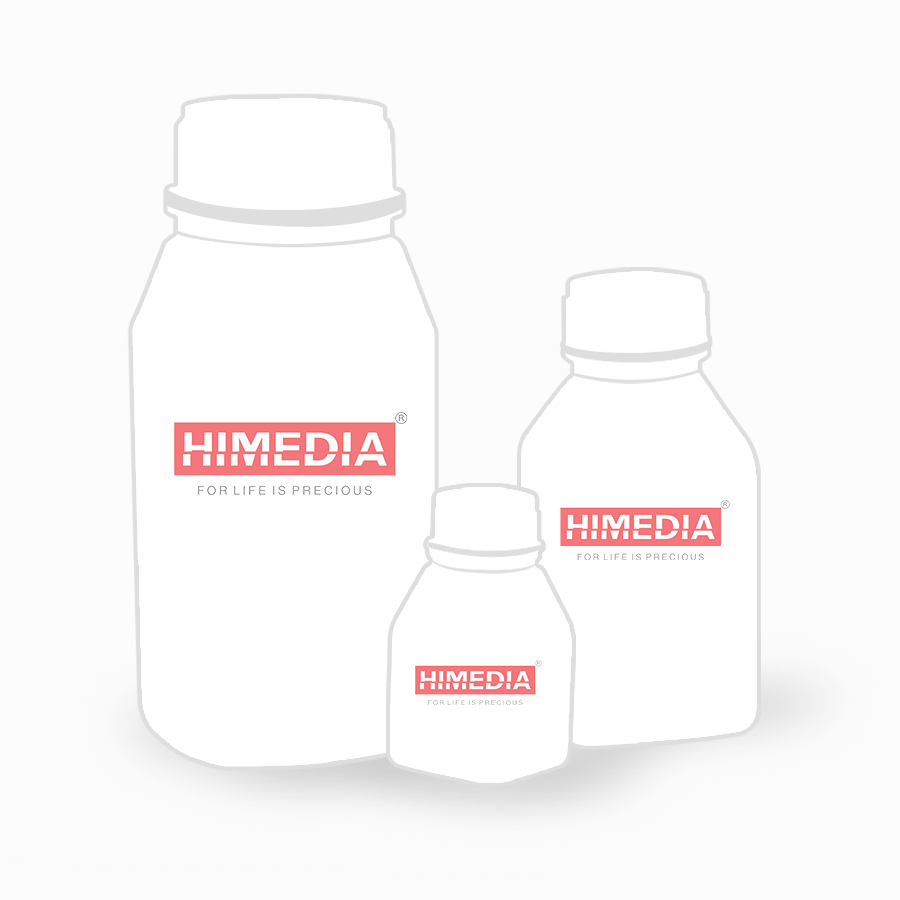 Your enquiry has been submitted
Your enquiry has been submitted
Tetrathionate CV Enrichment Broth
Selective Enrichment Media#CC293D
Intended Use
Recommended for the selective enrichment of Salmonellae from meat and foodstuffs.
Composition
| Ingredients | g/L |
|---|---|
| Tryptone | 4.300 |
| Peptone | 4.300 |
| Sodium chloride | 6.400 |
| Potassium tetrathionate | 20.000 |
| Crystal violet | 0.005 |
| Final pH (at 25°C) | 6.5±0.2 |
**Formula adjusted, standardized to suit performance parameters
Directions
Suspend 35.0 grams in 1000 ml purified/distilled water. Heat to boiling to dissolve the medium completely. Cool to 45-50°C. Dispense in sterile tubes or flasks as desired. DO NOT AUTOCLAVE. Note: The medium should be used on the day of preparation as the prepared medium is not stable.
Principle And Interpretation
The examination of various types of food products for presence of Salmonella requires methods different from those used in clinical laboratories. The need for such methods is due to the generally low numbers of Salmonella in foods and the frequently poor physiological state of these pathogens following exposure to stressful conditions during food processing or storage. Tetrathionate CV Enrichment Broth is used for the selective enrichment and isolation of Salmonella from meat and foodstuffs.
Tetrathionate Broth Base was originally described by Mueller (1) and he found that the medium selectively inhibits coliforms and permits unrestricted growth of enteric pathogens. Muellers medium was subsequently modified by Kauffman (2) and Knox (3) in which they obtained more number of isolates.
Tetrathionate Crystal Violet Enrichment Broth is prepared as per the formulation described by Preuss (4) and is used for the selective enrichment of Salmonellae from meat and foodstuffs (5). It complies with the specifications prescribed in the German Meat Inspection Law (6).
Tryptone and peptone are the sources of carbon, nitrogen, vitamins and minerals. Sodium deoxycholate and brilliant green and crystal violet inhibit gram-positive organisms. Potassium tetrathionate acts as a selective agent. Sodium chloride maintains the osmotic balance of the medium. After enrichment of the sample, streak on the plates of Brilliant Green Agar (M016), MacConkey Agar (M081), Bismuth Sulphite Agar (M027) for further confirmation.
Type of specimen
Food samples.
Specimen Collection and Handling
For food samples, follow appropriate techniques for sample collection and processing as per guidelines (7). After use, contaminated materials must be sterilized by autoclaving before discarding.
Warning and Precautions
Read the label before opening the container. Wear protective gloves/protective clothing/eye protection/face protection. Follow good microbiological lab practices while handling specimens and culture. Standard precautions as per established guidelines should be followed while handling specimens. Safety guidelines may be referred in individual safety data sheets.
Limitations
- For further confirmation, streak the enriched cultures after incubation, on plates of Brilliant Green Agar (M016), MacConkey Agar (M081).
Performance and Evaluation
Performance of the medium is expected when used as per the direction on the label within the expiry period when stored at recommended temperature.
Quality Control
Appearance Cream to yellow may have purple tinge homogeneous free flowing powder
Colour and Clarity of prepared medium Blue to light blue coloured clear solution without any precipitate
Reaction Reaction of 3.5% w/v aqueous solution at 25°C. pH: 6.5±0.2
pH 6.30-6.70
Cultural Response
Cultural characteristics observed after an incubation at 35-37°C for 18-24 hours (Recovery is done on Brilliant Green Agar M016).
| Organism | Inoculum (CFU) | Growth on M016 | Colour of colony |
|---|---|---|---|
| Escherichia coli ATCC 25922 (00013*) | 50-100 | none-poor | yellowish green |
| Salmonella Typhimurium ATCC 14028 (00031*) | 50-100 | good-luxuriant | pinkish white |
| Salmonella Enteritidis ATCC 13076 (00030*) | 50-100 | good-luxuriant | pinkish white |
| Staphylococcus aureus subsp. aureus ATCC 25923 (00034*) | >=104 | inhibited |
Key: *Corresponding WDCM numbers.
Storage and Shelf Life
Store between 10-30°C in a tightly closed container and the prepared medium at 15-30°C. Use before expiry date on the label. On opening, product should be properly stored dry, after tightly capping the bottle in order to prevent lump formation due to the hygroscopic nature of the product. Improper storage of the product may lead to lump formation. Store in dry ventilated area protected from extremes of temperature and sources of ignition. Seal the container tightly after use. Product performance is best if used within stated expiry period.
Disposal
User must ensure safe disposal by autoclaving and/or incineration of used or unusable preparations of this product. Follow established laboratory procedures in disposing of infectious materials and material that comes into contact with sample must be decontaminated and disposed of in accordance with current laboratory techniques (8,9).
Reference
- Mueller L., 1923, Soc. Biol., (Paris), 89:434.
- Kauffman F., 1930, Zentralb. Bakteriol. Parasitenkd. Infektionskr-Hyg. Abt. I. Orig., 113:148.
- Knox R., Gell P. and Pollack M., 1942, J. Pathol. Bacteriol, 54:469.
- Preuss H., 1949, Z. Hyg., 129:187.
- MacFaddin J. F., 1985, Media for Isolation-Cultivation-Identification-Maintenance of Medical Bacteria, Vol. 1, Williams and Wilkins, Baltimore.
- Deutsches Fleischbeschaugesetz : Anlage 1zu :20 Abs., 4.
- Salfinger Y., and Tortorello M.L. Fifth (Ed.), 2015, Compendium of Methods for the Microbiological Examination of Foods, 5th Ed., American Public Health Association, Washington, D.C.
- Isenberg, H.D. Clinical Microbiology Procedures Handbook 2nd Edition.
- Jorgensen, J.H., Pfaller, M.A., Carroll, K.C., Funke, G., Landry, M.L., Richter, S.S and Warnock., D.W. (2015) Manual of Clinical Microbiology, 11th Edition. Vol. 1.
| Product Name | Tetrathionate CV Enrichment Broth |
|---|---|
| SKU | M1256 |
| Product Type | Regular |
| Physical Form | Powder |
| Origin | Animal |
| Packaging type | HDPE |
| References | 1.Mueller L., 1923, Soc. Biol., (Paris), 89:434.2.Kauffman F., 1930, Zentralb. Bakteriol. Parasitenkd. Infektionskr-Hyg. Abt. I. Orig., 113:148.3.Knox R., Gell P. and Pollack M., 1942, J. Pathol. Bacteriol, 54:469.4.Preuss H., 1949, Z. Hyg., 129:187.5.MacFaddin J. F., 1985, Media for Isolation-Cultivation-Identification-Maintenance of Medical Bacteria, Vol. 1, Williams and Wilkins, Baltimore.6.Deutsches Fleischbeschaugesetz : Anlage 1zu :20 Abs., 4. |



